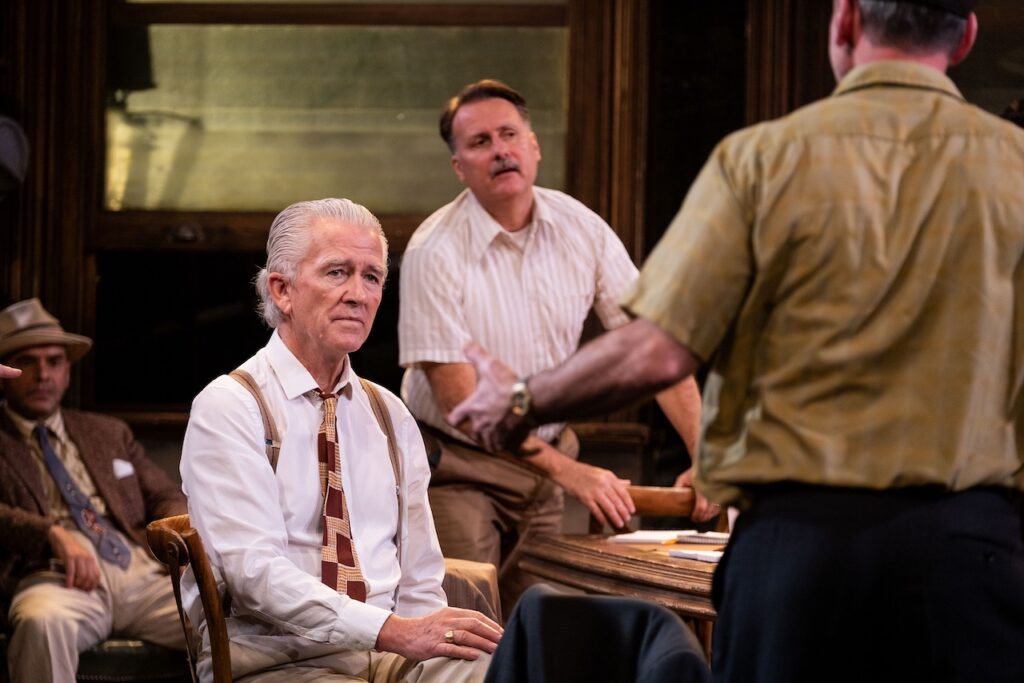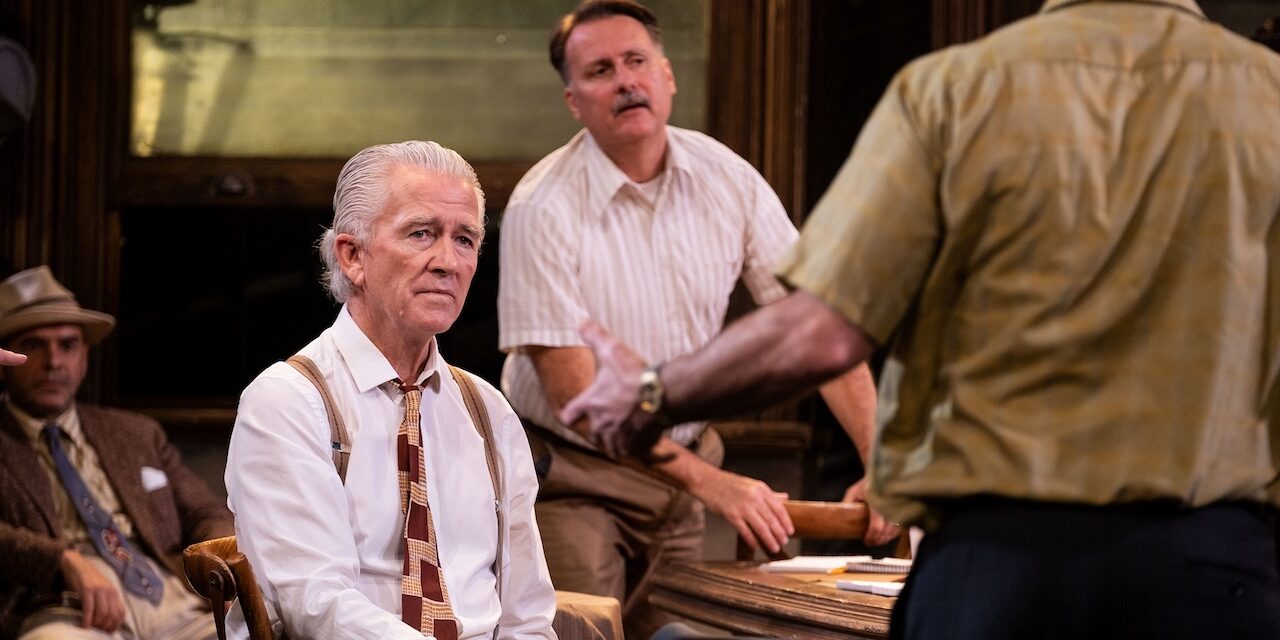
Patrick Duffy has captivated audiences on television for more than 45 years, from playing Bobby Ewing in 14 seasons of Dallas, Frank Lambert in the ABC sitcom Step by Step, Mark Harris in The Man from Atlantis, and Stephen Logan in CBS’s The Bold and the Beautiful. His previous stage credits include the UK tour of Love Letters, Art in the West End and the thriller Catch Me if You Can which visited Bath last year.
Tell us a little bit about Twelve Angry Men?
The play is a really well-crafted, delicate study of human nature and it’s so appropriate for the time we’re in right now. The subject matter could be taken from America’s newspaper articles on a daily basis; it’s frightening. It’s frightening, because we’re in the same position that they were portraying in the play in the 1950s, and this play was actually based on the things that went on in the 1860s.
That is going back hundreds of years, so some of the issues in the play must just be ingrained in human nature. Twelve Angry Men is a beautiful study on human nature, though my character, Juror 8, really doesn’t go through much of a transformation compared to the other eleven characters.
How does the play of Twelve Angry Men compare to the 1957 film?
I suppose a lot of people are going to be very familiar with the film because it is ubiquitous, it has such a pedigree from being nominated for three Oscars. What is most incredible is that the subject matter of this script hasn’t changed in the years since the film was released in 1957. And that feels frightening because it’s widely believed that if you don’t understand history, and learn from it, that you’re doomed to repeat it. But I’m not sure that’s entirely true. I think we are doomed to repeat history, because of our human nature.
I made the joke that I was cast in this part of Juror 8 because the last actor who did it had the same suit sizes I have! Because when people think of Twelve Angry Men, if you are aware of old movies, you think of Henry Fonda who played Juror 8, with his cream-coloured suit. That costume wasn’t by accident either, he was supposed to be the most heroic, and so wearing the suit and hat showed that, and he has the least baggage out of all of the jurors.
Every performance in that film was Oscar worthy material. And that’s why it is so iconic. The interesting thing is, and I’m not sure a younger audience is as well-versed in that old film genre as maybe people of my particular generation, but I was stunned by that movie. And I didn’t see it when it was originally released, as I was only 11 years old when that movie came out. So I saw it as a retrospective and when I was a young fledgling actor, and every single character was phenomenal.
The danger is trying to play your characters like those iconic people, but those iconic people were cast because the characters were written to accommodate. The play was not written for Lee J. Cobb and Henry Fonda, the play was written as a play and they were the perfect people to do it.
Can you tell us about your character, ‘Juror 8,’ in the show.
It’s so interesting to talk about my character Twelve Angry Men because the characters actually have no names, my character is only known as ‘Juror 8’. The hardest part for me as an actor, when I’m thinking about how to approach my character from the script, is that even before I arrived on the set for rehearsals, I was wondering who the hell I was about to be playing, because I had no concept about who any of the characters were, including my own ‘Juror 8’.
This is the same for the audience of course, and the play is written so that gradually you find out who these characters are, each of the jurors, though some more than others. This important information slowly reveals itself in the run up to the trial in the courtroom.
What we know from the script is that the character I play, Juror 8, is an architect, and he has two children. As an actor, you then have to build your character based on that background, but the great thing about this play is that it leaves the space for you develop your role yourself, so there is room to make the character your own too, which is the absolute lifeblood of acting.
Why do you think your character ‘Juror 8’ has no name?
I think this is very much on purpose because Juror 8 has to be seen as an everyman, the voice of reason. In theatre, when the announcer comes on, it’s like the voice of God and similarly, Juror 8 has those functions; he’s the conscience. He tries to trigger the conscience of the other eleven people in the room.
The premise of Twelve Angry Men is that it is eleven ‘guilty’ votes to one ‘innocent’ vote and the process of the play is in resolving that conundrum. I won’t give away any spoilers (even though the play has been around since 1957) but it isn’t a secret that it is a hung jury.
You have worked as an actor in film, TV, and theatre, so what’s the difference between mediums?
I try to view it that playing roles is the same no matter what the venue is, the main difference is the interaction between yourself and the audience if it’s a live performance. If you do anything pre-recorded for film or TV, your audience is the crew, and you look to the crew for that response to your performance. That if you are trying to make the audience watching happy, then you aim to make the crew laugh at whatever you want them to laugh at, and then cry whenever you want them to be sad, and you look to their reactions to see whether they believe it or not.
When you get on stage it feels a little like warfare. It’s more of a challenge. You go out there in front of thousands of people and you give it your all. Hopefully, you get the response that you aimed for, but if you don’t, you then have to change horses midstream. You have to recalibrate yourself, and that’s the energising thing that draws people to do theatre. I think I am inherently lazy, so the predominance of television versus theatre in my career is testament to that!
Twelve Angry Men has a star-studded ensemble cast, have you worked with any of these actors before?
Well, the nice thing is that three of the actors playing the jurors are people that I performed Catch Me If You Can with when I was here in the UK a year and a half ago, which makes it wonderful to come back and work again with Ben Nealon, Gray O’Brien and Paul Lavers. All three actors are completely different, both in terms of onstage performances, and so different from the roles that they played in Catch Me If You Can. That’s part of the bond of doing theatre; it is in the best possible sense, playing games with your friends.
What are you most looking forward to about the tour of Twelve Angry Men?
The last performance! That’s not just because then you get to return home, but it is on that last performance that you realise all the things you should have done in the first 200 performances. In film work, you call it ‘freeway scenes’, where you’ve done this show, you’re driving home at night on the freeway and you think to yourself “that’s what I should have done”. And you have no more chance to do it with film and TV. At least in theatre every night, you get a chance to polish the art of the performance by honing it again and again, and at the end, it comes out shiny. But at the end, you wish you could have known what the end looked like a little sooner in the process! I’m looking forward to this process, more than anything else; not opening night, not closing night, but the continuation of the project.
What would you like audiences to take away from the show?
I have this one line in the show which explains that it is so hard to separate prejudice from a situation – like in the play – of innocent or guilty, or opening your mind to thinking beyond what you believe. Everybody should question what they immediately believe. The most dangerous thing, in my opinion, in all of life, is to be so resolute in your knowledge that you don’t accept the chance that there is something else, and that you might be mistaken. Or that you are maybe not even mistaken, but it just might better to be open to a different point of view, rather than a slightly askew way of looking at something you might not question. By being closed off, we inhibit so much possibility in our lives and create so much damage.
Can you summarise Twelve Angry Men in three words?
Think, compare and compassion.
Twelve Angry Men appears at the Theatre Royal Bath from Monday 27th November to Saturday 2nd December. To book tickets contact the Theatre Royal Box Office on 01225 448844 or visit www.theatreroyal.org.uk
Photo credit: Jack Merriman


